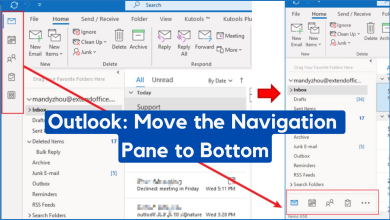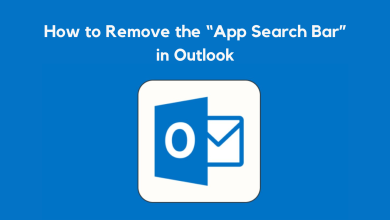How to Fix Outlook Unknown Error 0x80040600 on Windows
Some Windows users are seeing an ‘Unknown Error 0x80040600‘ message every time they send or receive emails via Outlook. Other affected users are saying that the issue only appears when they try to download email attachments from their Inbox.
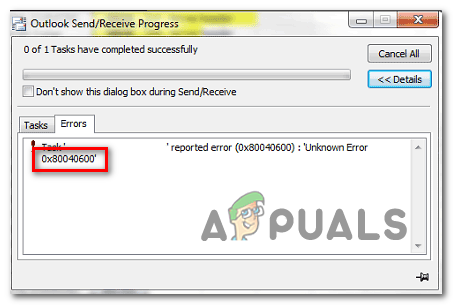
In most cases, the 0x80040600 error is a signal that you’re dealing with a partially corrupted .PST or .OST files. In this case, one way to resolve the issue would be to use the Inbox Repair Tool.
Under special circumstances, you might need to resort to removing the Outlook profile and re-adding it again in order to resolve the error message.
But keep in mind that depending on the gravity of the corruption, you might not be able to remove it conventionally – In this case, you’ll need to navigate to the location of the PST or OST file and either rename the Outlook data file or deleting it completely in order to force the program to create a new file from scratch.
Using the Inbox Repair tool
One of the most common causes that will ultimately cause the 0x80040600 error is an inconsistency with the Outlook (.PST or .OST file). This is a critical email file that stores important information that Outlook needs in order to sync your files in real-time.
If this file is corrupted, the email application that you’re using (Outlook in this case) will be prevented from communicating with the email servers.
In case this scenario is applicable to your current situation, you should be able to fix the issue by repairing the corrupted .PST or .OST files with the Inbox Repair Tool utility. Several affected users have confirmed that after performing this procedure and restarting their computer, the ‘Unknown Error 0x80040600‘ stopped appearing when they tried to send email or download email attachments.
Note: Depending on the Outlook version that you’re using, the location of this repair tool will be different (it’s included with every recent Outlook version). But the instructions below were tested and should work for Outlook 2013 and below.
Here’s a quick guide on repairing the Outlook file (.PST or .OST) using the Inbox Repair Tool:
- Ensure that Outlook and any associated process is completely closed.
- Visit this link (here) and download the Inbox Repair tool. Wait patiently until the download is complete, then double-click on the executable.
- Once you get to the first link, click on the Advanced hyperlink and ensure that the box associated with ‘Apply repairs Automatically‘ is checked. After you do this, click on Next to move forward.
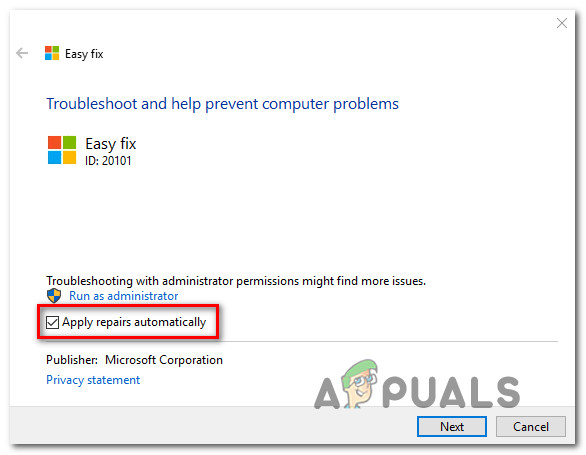
Applying repairs automatically Note: If the program doesn’t open with Administrative privileges by default, click on Run as Administrator and click Yes at the User Account Control (UAC) prompt.
- Start the utility by clicking Next and wait until the operation is complete. If a problem is identified, the utility will automatically recommend a viable repair strategy.
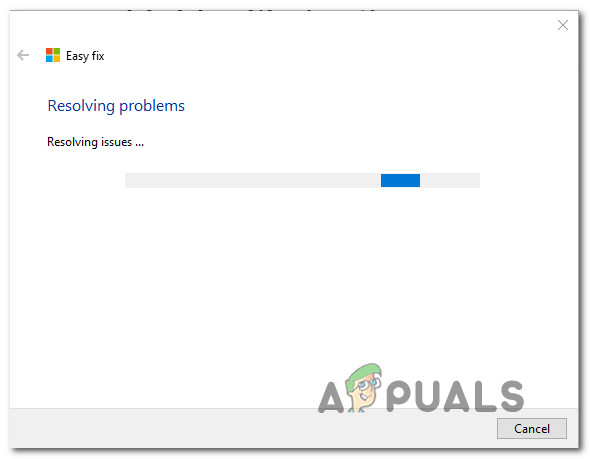
Resolving the issues with your .PST file - Once you’re inside the Microsoft Outlook Inbox Repair menu, click on Browse, then navigate to the location where your .PST / .OST file is stored.
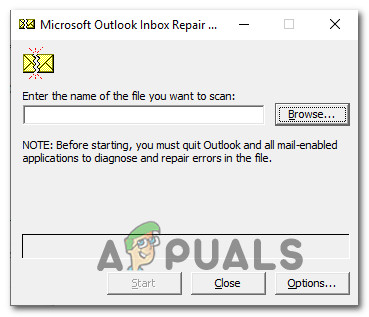
Selecting the .PST file using the Browse menu Note: The default location of your Outlook file is C:\Users\ \AppData\Local\MicrosoftOutlook. But it will be different if you have previously set a custom location.
- Once the operation is complete, restart Outlook again and see if the problem is now fixed.
In case you’re still encountering the same 0x80040600 error, move down to the next potential fix below.
Removing the Outlook profile
If repairing the PST / OST files didn’t fix the 0x80040600 error, you should try re-creating the email profile that Outlook uses by default. This should end up resolving the issue in case some kind of temporary data that is stored locally is causing the issue.
But keep in mind that by following through with this method, you will also lose any data that is currently stored on your Outlook profile.
If you decide to go through with this method, follow the steps below. The instructions should be applicable regardless of the Windows version that you’re using.
- Close Outlook and any associated service.
- Open up a Run dialog box by pressing Windows key + R. Next, type ‘control.exe’ and press Enter to open up the Classic Control Panel window.

Accessing the Classic Control Panel interface - Once you’re inside the classic Control Panel menu, use the search function in the top-right corner to search for ‘mail’. Next, click on Mail from the list of results.

Opening up the Mail app - From the main Mail Setup window, start by clicking on Show Profiles button associated with Profiles.
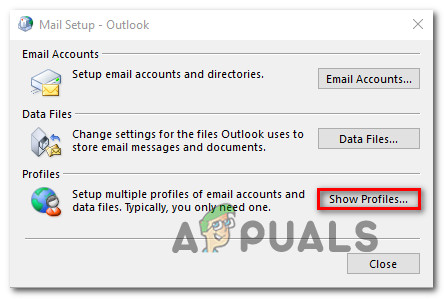
Accessing the Profiles menu - Inside the Mail menu, select the Outlook profile that you’re actively using (and encountering issues with) and click on the Remove button.
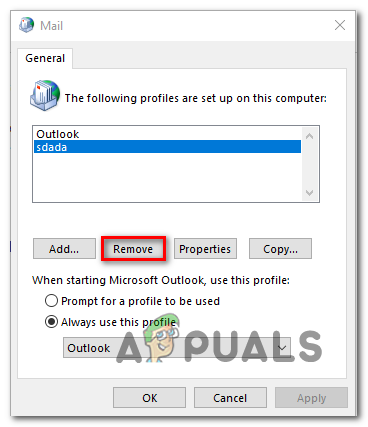
Removing any additional Outlook email profile - When asked the confirm the removal of the profile, click Yes to complete the operation.
- Start Outlook once again and configure your email from scratch. Because you previously deleted the old profile, the email client will create a new .OST or .PST profile and attach it to the new profile as soon as you finish signing in with your email credentials.
- Attempt to send an email again and see if you’re still encountering the same 0x80040600 error.
In case you’re still encountering the same issue, move down to the next potential fix below.
Renaming or Deleting the .PST / .OST file
Keep in mind that is the Outlook data file that is attached to your email account is corrupted, the email client might not be able to delete it conventionally. If this is the case in your situation, you will still encounter the same error since Outlook will resume using the same .PST or .OST file the next time you connect Outlook with your email account.
If this scenario is applicable, you should try to delete the Outlook data file or rename it manually in order to force the program to create a new instance from scratch.
Here’s a quick guide on deleting or renaming the Outlook data file manually:
- Open File Explorer and navigate to the following location manually or by pasting the entire address in the navigation bar and pressing Enter:
C:\Users\*YourUser*\AppData\Local\Microsoft\Outlook
Note: Keep in mind that *YourUser* is simply a placeholder. Replace it with your own username.
Note 2: If you want to navigate to the location manually, keep in mind that the App data folder is not visible by default. In order to make it visible, access the View tab from the ribbon bar at the top and ensure that the box associated with Hidden Items is checked.
View Hidden Items option is checked - Once you get to that location, you have two options – The easier option is to simply right-click on the PST / OST file and choose Delete from the context menu to get rid of it.
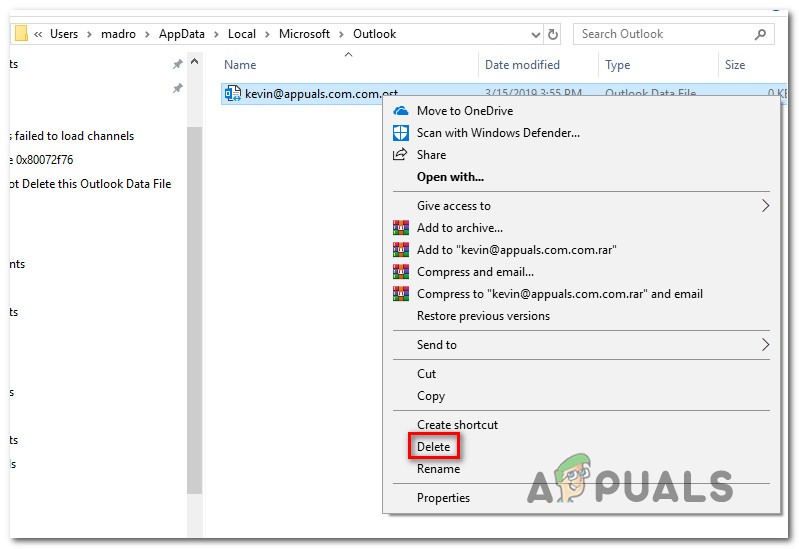
Deleting the PST / OST data file Note: Additionally, you can rename the file with the ‘.Old‘ extension in order to force Outlook to create a new profile from scratch. But keep in mind that in order to be able to view the extensions, you need to enable File name extensions from the View tab.

Enabling File Name Extensions from File Explorer - Connect your email account with Outlook once again and see if you are able to send or receive emails without encountering the 0x80040600 error.



